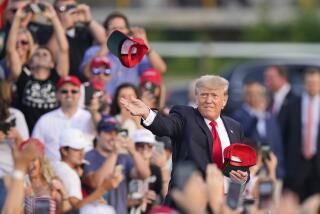Criminal Charges Unlikely in Tobacco Industry Probe : Health: Experts say the statute of limitations and difficulty in proving perjury mean that executives will escape prosecution.
- Share via
WASHINGTON — The Justice Department’s investigation of the tobacco industry, the newest front in the government’s assault on cigarette makers, almost certainly will not lead to criminal charges, according to department sources and legal experts.
Although an angry letter from seven congressmen that prompted the investigation alleges that tobacco executives “committed a series of serious crimes over a period of several decades,” the federal statute of limitations bars prosecutions for acts dating back more than five years.
Even if more recent actions are found to be deceptive, specifically the congressional testimony of tobacco executives earlier this year, they are unlikely to amount to the perjury alleged in the letter, the sources and legal experts said.
Those legal limits, combined with the practical difficulty of pursuing decades-old cases involving retired or deceased tobacco industry figures, suggest that the seven signers of the letter overreached in their attempts to broaden what had already been a wide attack on tobacco by Congress and the Administration.
Tobacco company officials contend that the June 23 letter was a blatant grab for publicity and an attempt to further smear the industry. The letter, whose chief author was Rep. Martin T. Meehan (D-Mass.), received extensive media coverage.
Meehan said that a Justice Department attorney and an FBI agent met with him last week shortly after Atty. Gen. Janet Reno told reporters that the government was looking into accusations in his letter. Reno said that officials of three divisions--criminal, antitrust and civil--were investigating aspects of the tobacco industry.
Asked this week about the dim prospects for any criminal charges, Meehan said that he would be content if the Justice Department and FBI conducted a thorough criminal investigation and issued a report of their findings, even if no indictments are returned.
Meehan said that a criminal division lawyer told him last week: “We are looking for a focus.” A former state prosecutor before he entered Congress last year, Meehan responded by volunteering to write a “prosecution memo” outlining criminal charges, including perjury, that he thought might apply.
“They said they’d be happy to have me do that,” the congressman said.
In his letter and a subsequent interview this week, Meehan said that executives of Brown & Williamson Tobacco Corp. “perjured themselves” earlier this year when they testified before the House Energy and Commerce subcommittee on health and the environment that they did not know nicotine was addictive.
Internal documents that have come to light from B&W;, the third largest U.S. tobacco firm, “flatly contradict” that claim, according to Meehan’s letter. The congressman also cited testimony by former scientists for Philip Morris who said that research in the 1980s showed nicotine was highly addictive.
Tobacco officials strongly deny that they have sought to deceive Congress or the public, and former Atty. Gen. Griffin B. Bell, representing an industry executive, has belittled the idea of a criminal investigation on grounds that executives were only expressing opinions about the relative health hazards of smoking.
“I’ve never heard of perjury based on giving an opinion,” Bell said. “We don’t put folks in jail for that, so far.”
Although Meehan’s letter refers to testimony before a subcommittee headed by Rep. Henry A. Waxman (D-Los Angeles), Waxman declined to join in the letter, even though he is a leading Capitol Hill foe of tobacco.
The subcommittee is in the midst of its own investigation of the tobacco industry, and congressional sources said that Waxman believes a competing inquiry by Justice might interfere with his own investigation or be premature.
Justice Department sources said that perjury charges are limited to testimony that is a clear-cut denial or contradiction of facts clearly known by the witness and where the motivation is to conceal criminal activity or to further it.
“I’m not trying to get tobacco executives hauled off to jail,” Meehan declared. “But their assertion that nicotine is not addictive is outrageous. We need to hold their feet to the fire.”
Sources said that the Justice Department antitrust and civil divisions, pursuing inquiries that began before Meehan’s letter, are looking into whether some companies colluded to suppress scientific research into less hazardous cigarettes and whether cigarette labeling accurately reflects nicotine content.
More to Read
Sign up for Essential California
The most important California stories and recommendations in your inbox every morning.
You may occasionally receive promotional content from the Los Angeles Times.









